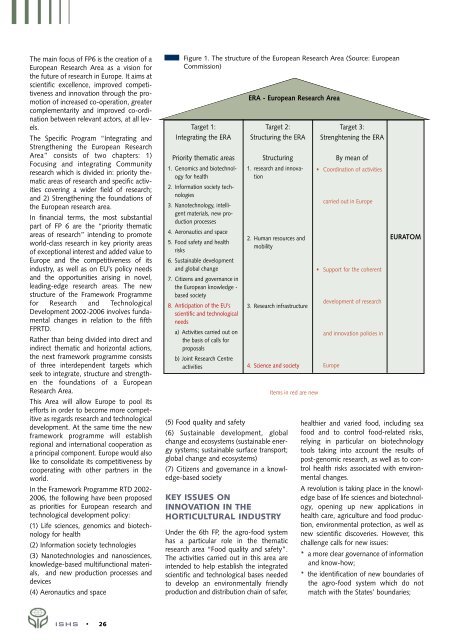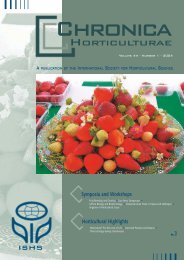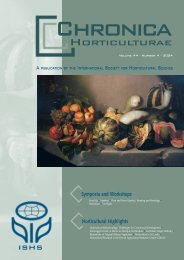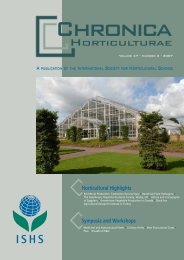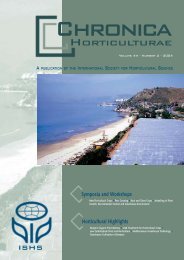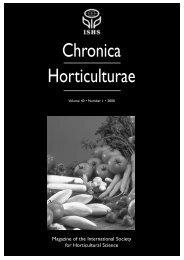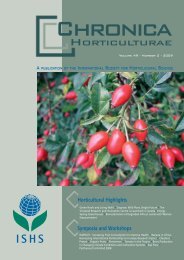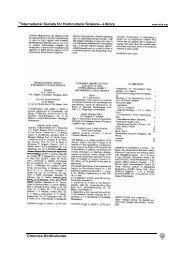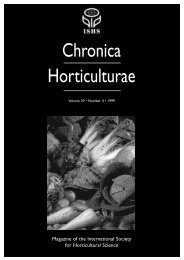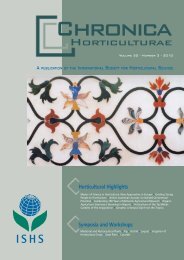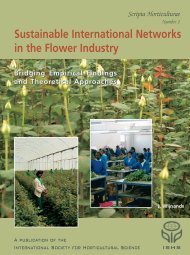Horticultural Science News - Acta Horticulturae
Horticultural Science News - Acta Horticulturae
Horticultural Science News - Acta Horticulturae
You also want an ePaper? Increase the reach of your titles
YUMPU automatically turns print PDFs into web optimized ePapers that Google loves.
The main focus of FP6 is the creation of a<br />
European Research Area as a vision for<br />
the future of research in Europe. It aims at<br />
scientific excellence, improved competitiveness<br />
and innovation through the promotion<br />
of increased co-operation, greater<br />
complementarity and improved co-ordination<br />
between relevant actors, at all levels.<br />
The Specific Program “Integrating and<br />
Strengthening the European Research<br />
Area” consists of two chapters: 1)<br />
Focusing and integrating Community<br />
research which is divided in: priority thematic<br />
areas of research and specific activities<br />
covering a wider field of research;<br />
and 2) Strengthening the foundations of<br />
the European research area.<br />
In financial terms, the most substantial<br />
part of FP 6 are the “priority thematic<br />
areas of research” intending to promote<br />
world-class research in key priority areas<br />
of exceptional interest and added value to<br />
Europe and the competitiveness of its<br />
industry, as well as on EU’s policy needs<br />
and the opportunities arising in novel,<br />
leading-edge research areas. The new<br />
structure of the Framework Programme<br />
for Research and Technological<br />
Development 2002-2006 involves fundamental<br />
changes in relation to the fifth<br />
FPRTD.<br />
Rather than being divided into direct and<br />
indirect thematic and horizontal actions,<br />
the next framework programme consists<br />
of three interdependent targets which<br />
seek to integrate, structure and strengthen<br />
the foundations of a European<br />
Research Area.<br />
This Area will allow Europe to pool its<br />
efforts in order to become more competitive<br />
as regards research and technological<br />
development. At the same time the new<br />
framework programme will establish<br />
regional and international cooperation as<br />
a principal component. Europe would also<br />
like to consolidate its competitiveness by<br />
cooperating with other partners in the<br />
world.<br />
In the Framework Programme RTD 2002-<br />
2006, the following have been proposed<br />
as priorities for European research and<br />
technological development policy:<br />
(1) Life sciences, genomics and biotechnology<br />
for health<br />
(2) Information society technologies<br />
(3) Nanotechnologies and nanosciences,<br />
knowledge-based multifunctional materials,<br />
and new production processes and<br />
devices<br />
(4) Aeronautics and space<br />
Figure 1. The structure of the European Research Area (Source: European<br />
Commission)<br />
Target 1:<br />
Integrating the ERA<br />
Priority thematic areas<br />
1. Genomics and biotechnology<br />
for health<br />
2. Information society technologies<br />
3. Nanotechnology, intelligent<br />
materials, new production<br />
processes<br />
4. Aeronautics and space<br />
5. Food safety and health<br />
risks<br />
6. Sustainable development<br />
and global change<br />
7. Citizens and governance in<br />
the European knowledge -<br />
based society<br />
8. Anticipation of the EU’s<br />
scientific and technological<br />
needs<br />
a) Activities carried out on<br />
the basis of calls for<br />
proposals<br />
b) Joint Research Centre<br />
activities<br />
(5) Food quality and safety<br />
(6) Sustainable development, global<br />
change and ecosystems (sustainable energy<br />
systems; sustainable surface transport;<br />
global change and ecosystems)<br />
(7) Citizens and governance in a knowledge-based<br />
society<br />
KEY ISSUES ON<br />
INNOVATION IN THE<br />
HORTICULTURAL INDUSTRY<br />
Under the 6th FP, the agro-food system<br />
has a particular role in the thematic<br />
research area “Food quality and safety”.<br />
The activities carried out in this area are<br />
intended to help establish the integrated<br />
scientific and technological bases needed<br />
to develop an environmentally friendly<br />
production and distribution chain of safer,<br />
ERA - European Research Area<br />
Target 2:<br />
Structuring the ERA<br />
Structuring<br />
1. research and innovation<br />
2. Human resources and<br />
mobility<br />
3. Research infrastructure<br />
4. <strong>Science</strong> and society<br />
Items in red are new<br />
Target 3:<br />
Strenghtening the ERA<br />
By mean of<br />
• Coordination of activities<br />
carried out in Europe<br />
• Support for the coherent<br />
development of research<br />
and innovation policies in<br />
Europe<br />
EURATOM<br />
healthier and varied food, including sea<br />
food and to control food-related risks,<br />
relying in particular on biotechnology<br />
tools taking into account the results of<br />
post-genomic research, as well as to control<br />
health risks associated with environmental<br />
changes.<br />
A revolution is taking place in the knowledge<br />
base of life sciences and biotechnology,<br />
opening up new applications in<br />
health care, agriculture and food production,<br />
environmental protection, as well as<br />
new scientific discoveries. However, this<br />
challenge calls for new issues:<br />
* a more clear governance of information<br />
and know-how;<br />
* the identification of new boundaries of<br />
the agro-food system which do not<br />
match with the States’ boundaries;<br />
ISHS • 26


